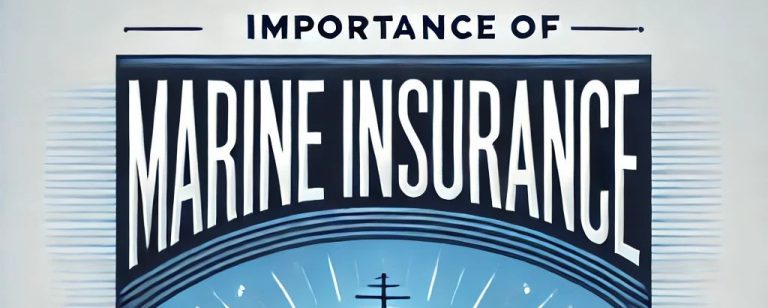Marine insurance protects in case of disasters associated with the transportation of goods along sea routes. With smooth international trade, businesses are protected from huge losses. The importance of marine insurance cannot be undertaken without mentioning how it is crucial in the globally connected economy today. This coverage reduces uncertainties within the maritime industry and fosters stability for exporters, importers, and carriers. This article will explore the meaning, types, and critical importance of marine insurance, with real-world marine insurance examples that illustrate its value.
What is Marine Insurance?
Marine insurance is a type of insurance policy that provides coverage for loss or damage to cargo, ships, and other assets during transit over water. This form of insurance protects stakeholders involved in maritime trade against unforeseen events such as accidents, natural disasters, or piracy. By transferring the financial risk to an insurance company, marine insurance ensures that businesses can recover quickly from maritime mishaps.
Features of Marine Insurance
Marine insurance is essential for protecting goods, ships, and freight during transit across seas. It shields businesses from losses caused by natural disasters, theft, or mishandling, ensuring smooth operations. Often a mandatory requirement, it provides security and builds trust in international trade.
- Covers goods, ships, and freight during marine transit: It ensures the safety of valuable cargo, ships, and freight while they are in transit across seas or waterways. This coverage protects businesses from unexpected losses during the journey, whether due to accidents or unforeseen circumstances. It provides peace of mind for traders and shipowners, knowing their assets are secure.
- Protects against losses caused by natural calamities, theft, or mishandling: This insurance policy shields businesses from financial losses caused by events like storms, piracy, or poor handling of goods. It ensures that companies are compensated for damages, helping them recover quickly. By covering these risks, it allows businesses to maintain operations without significant disruptions.
- Often mandatory for businesses involved in international shipping: International shipping agreements often require businesses to have marine insurance as a legal obligation. It helps ensure compliance with trade laws and builds trust among trading partners. By meeting these requirements, businesses can avoid penalties and delays, ensuring smooth global operations.
Types of Marine Insurance
Marine insurance policies are tailored to cover different aspects of maritime operations, ensuring comprehensive protection. From safeguarding ships and cargo to securing freight payments and addressing liabilities, these policies help businesses mitigate risks effectively. Understanding each type ensures better preparedness in maritime trade.
Hull Insurance
- Protection: Shields shipowners from unexpected repair or replacement costs, ensuring uninterrupted operations.
- Coverage: Includes damages to the ship’s body, machinery, and essential equipment caused by accidents, collisions, or natural disasters.
- Example: A shipping company insures its vessel to cover expenses for repairs after a storm damages the hull and machinery.
Cargo Insurance
- Security: Ensures the safety of goods transported, covering losses due to accidents, theft, or natural calamities.
- Trust: Builds confidence among traders, knowing their shipments are protected from financial risks.
- Example: An exporter insures a consignment of electronics, guaranteeing compensation for damages during transit caused by mishandling.
Freight Insurance
- Assurance: Secures the freight charges even if goods are lost or damaged before delivery.
- Reliability: Protects logistics companies from financial risks and ensures payment stability.
- Example: A logistics firm insures its freight charges, ensuring they receive the agreed payment even if cargo is lost at sea.
Liability Insurance
- Risk Mitigation: Covers legal and financial liabilities arising from damage to third-party property or injuries caused by the insured vessel.
- Compliance: Helps shipowners meet international legal obligations and avoid heavy penalties.
- Example: A shipping company opts for liability insurance to cover claims made by other vessels after an accidental collision at a busy port.
Importance of Marine Insurance
Marine insurance plays a vital role in safeguarding businesses against the uncertainties of global trade. It protects goods, ensures compliance with international regulations, and supports economic growth by reducing financial risks. Understanding its benefits highlights its importance in smooth and secure trade operations.
Protection Against Losses
- Coverage: Safeguards businesses and individuals from unexpected financial losses caused by accidents, theft, or natural disasters during transit.
- Continuity: Ensures operations continue smoothly by covering damages and minimizing interruptions in supply chains.
- Example: A damaged shipment is compensated, allowing businesses to meet customer demands without financial strain.
Encourages International Trade
- Trust: Builds confidence among exporters and importers by reducing the risks associated with global trade.
- Ease: Makes trading smoother by protecting goods in transit, even across volatile regions.
- Example: Insurance assures an exporter that their investment is secure, encouraging more trade opportunities.
Mandatory Compliance
- Legal Security: Meets international shipping requirements, preventing legal disputes or shipment delays.
- Credibility: Ensures businesses are seen as reliable partners by adhering to global shipping norms.
- Example: A company fulfilling marine insurance obligations gains trust and avoids penalties.
Supports Economic Stability
- Resilience: Helps businesses bounce back from large-scale losses, protecting jobs and investments.
- Growth: Encourages expansion by reducing the financial risks of operating in uncertain environments.
- Example: A manufacturer with insurance recovers faster after a shipment loss, ensuring business continuity.
Customizable Coverage
- Specificity: Policies can be adjusted to cover unique risks, such as high-value cargo or challenging routes.
- Flexibility: Includes add-ons like coverage for piracy or war zones, addressing specialized needs.
- Example: A shipping company transporting electronics can add extra protection for sensitive cargo.
Marine Insurance FAQs
What is marine insurance, and why is it important?
Marine insurance protects against losses during maritime transit. It ensures financial security, promotes international trade, and supports legal compliance.
What are the types of marine insurance?
Marine insurance includes hull insurance, cargo insurance, freight insurance, and liability insurance, each addressing specific maritime risks.
Can you provide marine insurance examples?
Insuring a ship against storm damage. Covering a shipment of textiles for theft during transit.
How does marine insurance support businesses?
It mitigates financial risks, fosters economic stability, and ensures legal and contractual compliance for maritime trade.
Is marine insurance mandatory?
While not universally mandatory, many international shipping agreements require marine insurance to safeguard trade interests.


